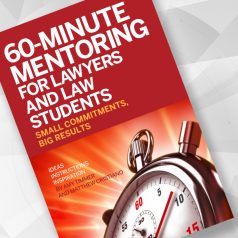When it comes to reaching partners, empathy, relationship-building and a customer-service mindset are key ingredients for young lawyers.
Attend (or eavesdrop on) any gathering of young associates, and you’ll likely hear them commiserating on how hard it is to communicate with firm partners and shareholders. What’s the secret to connecting? Here are three key ingredients for having less stressful and more successful communications with firm partners and shareholders.
Lead With Empathy
This ingredient catches most young lawyers off guard. After all, the life of an associate, especially in BigLaw, is no picnic. Between learning to practice law (aka avoiding legal malpractice) and trying to make billable hours while still trying to have a life outside of work, the idea of empathizing with the very people who are “making your life miserable” may be laughable.
At the same time, partners are people, too. They too are trying to make billable hours while still trying to have a life outside of work — but they also have to keep current clients happy, find new clients, review associate work and billing, help run a law firm and recruit, teach and mentor young lawyers. So, keep in mind that as human beings, some partners may be better at some of that than others.
How does empathy help in all of this?
When you lead with empathy and realize that partners have a lot more going on, feedback — whether terse and direct, limited and lacking, or subjective and confusing — can feel a lot less personal. Because most of the time, it really isn’t personal. The one-word responses may simply be the product of a partner who is overwhelmed or busy. The mixed messages may just mean the partner forgot what they told you on the previous draft. Or, now that you’ve made the change, they can see they liked the previous draft better.
Realizing this can take the perceived “intent” or “emotion” from communications. Once you remove those perceptions, it empowers you to be intentional about your own growth and ask for the feedback, clarification or direction you need.
Build a Relationship
A partner-associate relationship can be transactional, just like an attorney-client relationship. Many are. But most successful relationships are more. And if young lawyers want to be a “go-to” and get repeat work, be mentored and trusted, and be given the benefit of the doubt when mistakes happen, they need to build and grow a relationship.
This won’t happen overnight, and the “how” will differ from person to person. However, it is likely to include the associate being available, helpful, consistently meeting deadlines and providing competent legal work — but also being curious and interested in getting to know the partner as a human being. This can show up as small talk about holiday plans before talking about strategy, or in a scheduled coffee, lunch or mentoring sessions. You should also take advantage of opportunities to observe depositions, mediations or hearings (even if nonbillable) and use that time to learn from the partner by asking questions about their approach — and to get to know them (and let them get to know you).
In a nutshell, in my experience, people trust and invest in people they know and like. So be a person that shareholders can get to know and like (and can trust).
Cultivate a Customer Service Mindset
Ever heard “the customer is always right”? For young lawyers, partners are the customers. And for successful communication, it behooves young lawyers to communicate with partners in the way the partner prefers: whether that’s in person, over the telephone, via a video call, or through email, chat or text messaging. Some partners may even prefer certain communications through one medium and other types of communication through another. As a young lawyer, it can be helpful to keep notes about each partner’s preferences.
Note, though: While it’s important to know partners’ preferences, the advice isn’t to be a potted plant or a “yes” person. When it comes to the law, the partner may not always be right because they haven’t done the most recent research or review of case law. The customer-service mindset comes in the way you communicate that your partner is relying on overturned precedent. And don’t forget that you can build trust by adding value, such as through ideas for innovation.
While “secret sauce” may be a bit strong of a label for empathy, relationship-building and a customer-service mindset, communicating with your boss without these key ingredients is a recipe for disaster.
Illustration ©iStockPhoto.com
Subscribe to Attorney at Work
Get really good ideas every day to help you create a fulfilling, successful law practice: Subscribe to the Daily Dispatch (it’s free).
YOU CAN NEVER HAVE TOO MANY MENTORS


















